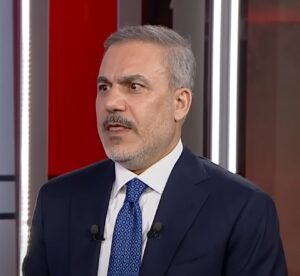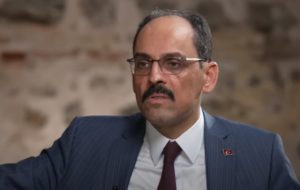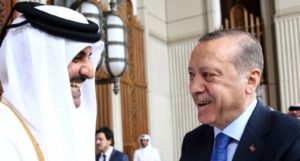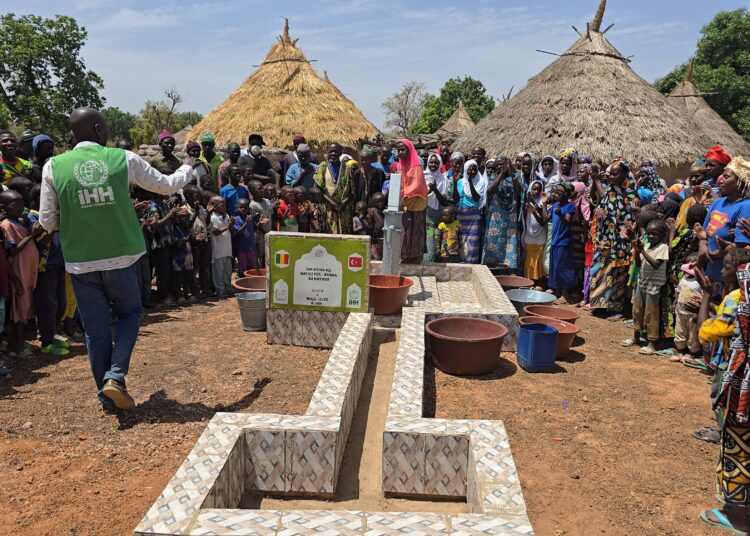Abdullah Bozkurt/Stockholm
A letter signed by Turkish Foreign Minister Hakan Fidan sheds light on how Ankara systematically leverages nongovernmental organizations (NGOs) abroad to advance its foreign policy agenda and promote divisive Islamist ideology, raising concerns about the politicization of humanitarian aid.
The letter, sent to the Parliament Speaker’s Office on June 17, outlines how Turkish NGOs that engage in humanitarian aid campaigns outside of Turkey are closely monitored and coordinated by the state. While these activities are framed as charitable missions distributing food, clothing and hygiene supplies, Fidan underscores that they also serve a broader strategic function: enhancing Turkey’s international visibility and expanding its soft power influence.
According to the letter NGOs are not merely independent actors but are instructed to operate “in close coordination with Turkish embassies and consulates” to ensure that their activities align with Ankara’s foreign policy priorities. This coordination, the letter notes, is meant to account for local conditions, cultural sensitivities and the political needs of the host countries.
The foreign ministry even holds regular “coordination meetings” with NGOs, along with other state institutions, to shape their overseas activities and provide “guidance” on what issues to prioritize. In practice this blurs the line between humanitarian relief and political influence campaigns.
Turkish Foreign Minister Hakan Fidan’s letter reveals how Turkey leverages NGOs abroad to advance the political agenda of the Islamist government of President Recep Tayyip Erdogan:
“Our ministry also organizes coordination meetings with NGOs engaged in external aid activities, with the participation of relevant institutions and organizations, and engages in various information-sharing efforts regarding issues that should be taken into account in the countries where they operate,” Fidan wrote.
One of the agencies involved in these coordination meetings is Turkey’s National Intelligence Organization (MIT), which has aggressively expanded its overseas espionage operations over the past decade. It has built informant networks and recruited assets to advance the ideology and objectives of President Recep Tayyip Erdogan’s Islamist government, often at the expense of the host countries’ interests.
MIT has also embedded its agents in NGOs operating abroad, using humanitarian work as a cover to develop assets, recruit informants and gather intelligence on individuals and groups opposing the Erdogan regime.
Fidan admitted that the foreign ministry, which runs its own powerful intelligence unit known as the Intelligence and Research Directorate (İstihbarat ve Güvenlik İşleri Genel Müdürlüğü), provides the interior ministry with information on the activities of Turkish NGOs and issues guidelines on how they should operate.
Critics contend that the letter reveals Turkey’s exploitation of civil society groups for geopolitical purposes. Rather than allowing NGOs to function independently, Ankara weaponizes humanitarian aid and charitable work, transforming basic deliverables like food parcels and hygiene kits into tools of political influence.

The revelations in the letter, a copy of which was obtained by Nordic Monitor, come amid growing accusations that Turkey exploits its global NGO networks not only to project soft power but also as a cover for intelligence gathering and influence operations. By embedding its foreign policy agenda in ostensibly neutral aid efforts, Ankara risks further eroding trust in genuine humanitarian work and casting a long shadow over Turkish NGOs operating abroad.
There is solid evidence that Turkey has used NGOs abroad to advance its national interests and has employed them to conduct clandestine activities.
For instance, during his tenure as head of MIT from 2010 to 2023, Fidan relied on the Foundation for Human Rights and Freedoms and Humanitarian Relief (İnsan Hak ve Hürriyetleri ve İnsani Yardım Vakfı, or IHH), among other Turkish organizations, to conduct intelligence operations abroad. In Syria and Libya in particular the IHH was accused of transporting arms and fighters and supplying logistics to jihadist groups backed by Turkey, all under the guise of humanitarian aid.
Backed openly by the Erdogan government, the IHH operates in 123 countries and claims nearly 100,000 volunteers. In 2024 the organization allocated a large share of its 9.2 billion Turkish lira budget to countries including Syria, Afghanistan, Somalia, Palestine, Pakistan, Yemen, Sudan, Niger and Bangladesh — destinations where funds have been suspected of ending up in the hands of radical groups.
Another organization used by the Erdogan government to advance Turkey’s foreign policy objectives and promote his hardline political Islamist ideology is the Aziz Mahmud Hüdayi (Hudayi) Foundation. Particularly active in Africa and Asia, the foundation operates dozens of entities under the guise of charitable work, education and humanitarian activities.

A classified wiretap published by Nordic Monitor in 2020 revealed a private conversation between President Erdogan and Mustafa Latif Topbaş, a businessman closely associated with Erdogan and a partner of Yasin al-Qadi in covert dealings in Turkey. Al-Qadi, an Egyptian-born Saudi national, was previously flagged by both the US Treasury and the UN’s al-Qaida sanctions committee.
According to the wiretap, Erdogan called Topbaş in Niamey and asked Topbaş what the Hudayi Foundation needed in Niger, while Erdogan was paying an official visit to the country. “I think there are friends from the [Hudayi] Foundation [in Niamey]. They can contact me,” Erdogan stated, adding, “I am going to dinner with President [Mahamadou Issoufou].” Erdogan told Topbaş he would ask then-president Issoufou to provide land or a building to the Hudayi Foundation in Niger. Then, Topbaş confirmed that the foundation representatives would inform Erdogan of Hudayi’s needs before the official dinner.
Erdogan then informed Topbaş of his initiatives for land provided by the government of Gabon to Hudayi. “We got land [for the foundation] in Gabon. We can discuss it when I get back. They [the Gabon government] first provided around 2,500 square meters [of land], and then they increased it to 20 acres,” Erdogan told Topbaş.
The foundation was chaired by Ahmed Hamdi Topbaş, another figure known for his close links to President Erdogan and a cousin of Latif Topbaş. The Topbaş family is known as one of the main financial supporters of President Erdogan’s Islamist policies and his ruling party.
Another secret wiretap published by Nordic Monitor in 2023 revealed connections between İbrahim Kalın, the current head of Turkey’s intelligence agency, and the Hudayi Foundation. In the recording Kalın, then serving as Erdogan’s chief aide, was briefing the late businessman Abdullah Tivnikli on how the government was lobbying on behalf of the foundation during Erdogan’s tour of Africa.

The two were discussing a decades-long strategy to cultivate a politically Islamist generation in Africa, leveraging Turkish government influence and affiliated Islamist organizations.
Another organization leveraged by the Erdogan government to advance its political objectives is the Turken Foundation, which was registered in 2014 as a 501(c)(3) nonprofit educational organization with the US Internal Revenue Service. Turken owns multiple properties in the US, primarily serves the American Muslim community and facilitates the arrival of Turkish students, many of whom are exposed to political Islamist ideology, to study in the country.
The connection between Turken and its founding organizations, the Ensar Foundation and the Turkey Youth and Education Service Foundation (TÜRGEV) in Turkey, raises serious concerns about the potential implications of their activities in the United States. The ultra-religious Ensar Foundation gained notoriety in Turkey due to several sexual abuse cases involving minors in their dormitories.
TÜRGEV, meanwhile, is directly connected to President Erdogan’s family and has been involved in numerous educational and youth-focused initiatives aimed at promoting political Islam. Both TÜRGEV and Turken have received funding and support from the Erdogan government. Young people nurtured by these organizations were often fast-tracked into government positions, reflecting the administration’s long-term strategy to reshape state institutions and agencies in line with political Islamist ideology.
There are ample reasons for concern regarding the Turkish foreign minister’s letter, which details the government’s systematic use of Turkish NGOs to advance President Erdogan’s policies.












